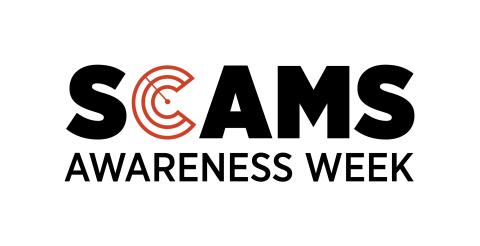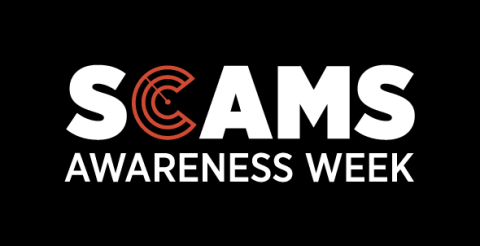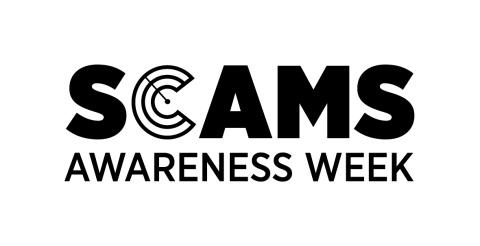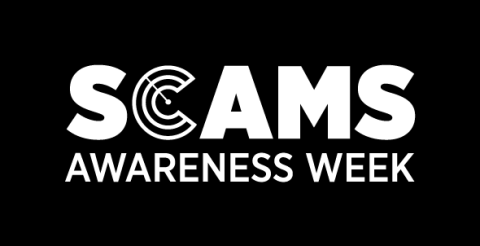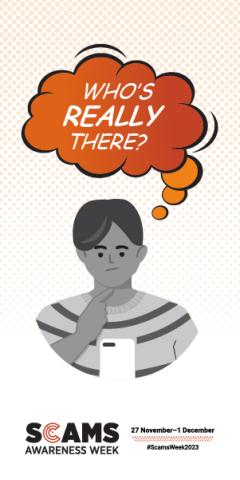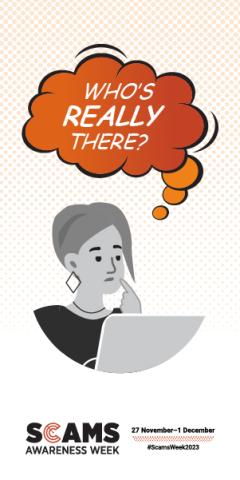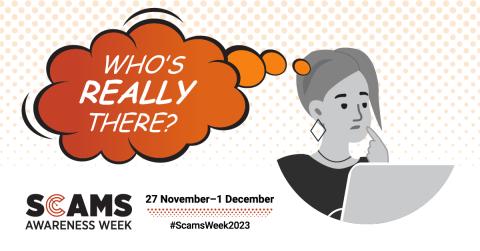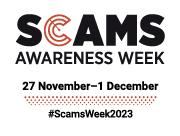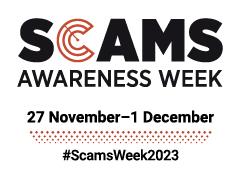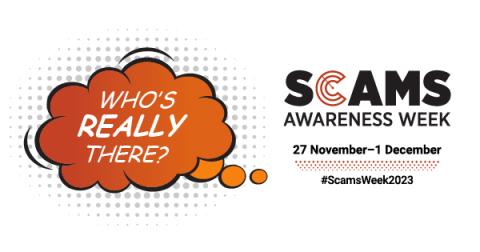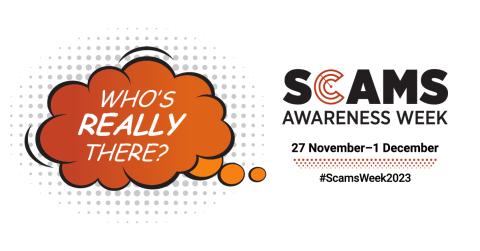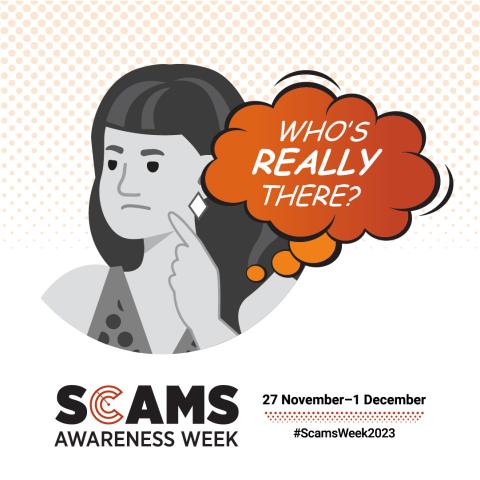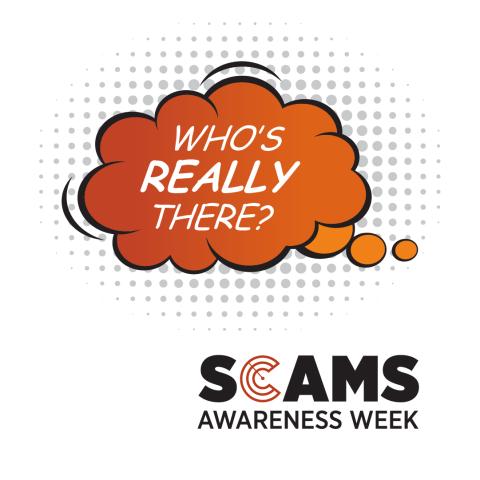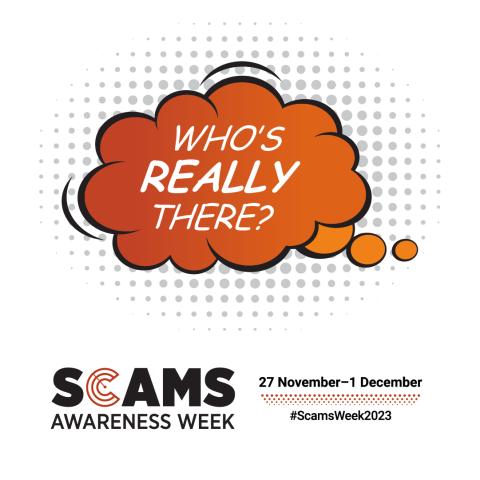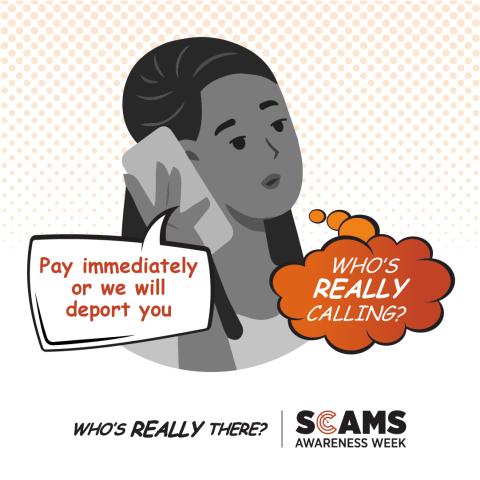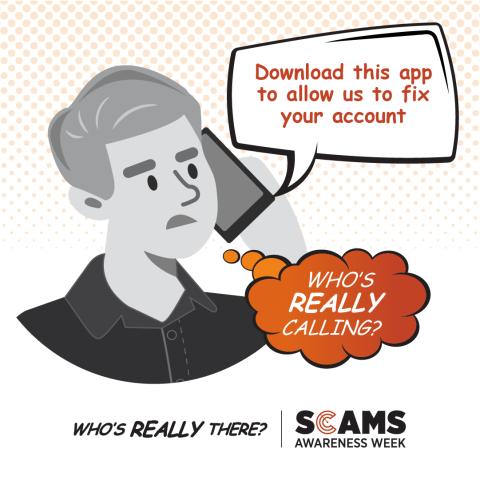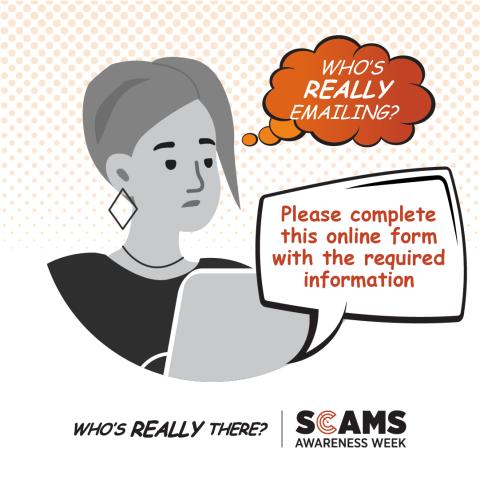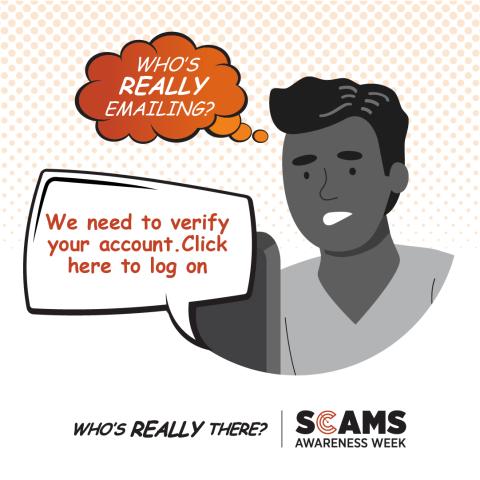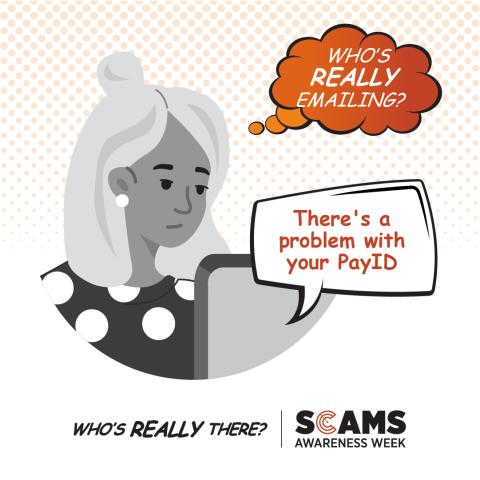These campaign resources were for Scams Awareness Week 2023.
On this page
Plan your campaign
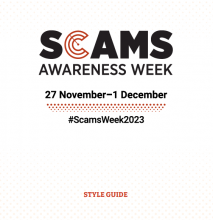
Use this guide to adapt campaign resources to your needs.
Download PDF (2.7MB)
Key messages for the 2023 campaign on impersonation scams.
Download PDF (87KB)
Key statistics for the 2023 campaign on impersonation scams.
Download PDF (104KB)
PowerPoint presentation for the 2023 campaign on impersonation scams.
Download PDF (1.7MB)
Case studies
Kelly got a call from a woman saying she was from the bank’s fraud team. She told Kelly she was calling to confirm a transaction of $17,000 for accommodation and car hire in New Zealand.
Kelly was immediately worried. She didn’t know anything about the transaction.
The caller then told Kelly about another transaction from her account. This was one Kelly had made.
The caller told Kelly she had to secure her account to stop further unauthorised use.
Panicked, Kelly followed the caller’s instructions and logged into her online banking account.
They told her to change her password, giving her a temporary password to use. Kelly didn’t realise that doing this gave the scammers access to her account.
Kelly felt relieved when she noticed there were no signs of the $17,000 transaction on her account, then the call dropped out.
Kelly soon got another call. This time it was her real bank, telling her that her entire savings of $48,000 had been withdrawn.
The bank told her the funds had been immediately converted to cryptocurrency, and she was not likely to get it back.
How the scam works
This impersonation scam uses a trusted organisation, the threat of losing money and a sense of urgency to make us act.
If you receive unexpected or suspicious contact from someone claiming to be your bank, stop the contact immediately and notify your bank.
How to protect yourself
Always take the time to independently contact your bank using a secure app or trusted number you’ve verified yourself.
Never be pressured to give someone your private information.
Report the scam to us so we can warn others and disrupt the scam.
Jake received a text message that appeared to be from myGov. The message included a link, and said he needed to review documents in his account before the deadline.
Jake clicked the link, which went to a website that appeared to be myGov. He logged in and saw a questionnaire to complete, confirming his identity and tax file number.
Jake didn’t have all the information at the time, so he couldn’t complete the questionnaire. A few days later, he tried to log in but couldn’t. Instead, he got a message saying his access was denied.
Jake later found that the scammers had managed to log into his tax portal and amend his tax return, adding a $30k deduction.
They had changed his bank account details to their own, and changed his contact details so he didn’t receive any notifications about his tax return.
How the scam works
This impersonation scam involves phishing, a way of tricking you into giving your personal information by pretending to be an authority or organisation you know and trust.
Links in these messages lead you to fake or ‘spoofed’ websites: sites that look like the real thing.
How to protect yourself
Never click on links in messages. If you receive a suspicious message with a link asking you to log in, immediately delete it and contact the organisation to let them know.
If your personal information has been compromised, take action to prevent further identity theft. Contact IDCARE for help and support.
Report the scam to us so we can warn others and disrupt the scam.
Harry got a call from a Mandarin-speaking person who said they were from a government department.
They told him that his name and a foreign phone number had been used in illegal activities, and he must report it to the Chinese police.
The call was redirected to a fake police line in China that sounded legitimate. They told Harry to lodge his report through video call.
On the video call, a person dressed like a police officer in front of a police sign said they had Harry’s passport details and showed him what looked Chinese legal documents and a warrant for his arrest.
He was told he faced jail, but if he paid a large amount of money, he could protect himself and his family.
They warned Harry that if he told anyone, they would face jail time in China of up to 10 years. Harry was so frightened that he lied to his family about why he needed the money.
How the scam works
This scam uses phone ‘spoofing’ technology. Scammers pretend to be from an organisation and claim you need to pay money.
They may use threats of arrest, deportation and physical harm. Some even monitor you through messaging and video platforms.
They use urgency and fear, pressuring you to pay immediately.
How to protect yourself
Never engage with threatening calls telling you to prove you’re not involved in a crime.
Don’t follow their instructions: this only escalates intimidation and attempts to get your money. Hang up and don’t respond.
Never leave your camera on because someone has instructed you to. If you’re worried about your safety, call police immediately on 000.
If you think you’ve shared personal information, contact IDCARE for help and support.
Report the scam to us so we can warn others and disrupt the scam.
Anita wanted to earn some extra money. When she saw a job ad on Facebook offering part-time work from home, she responded.
Soon after, she was contacted through WhatsApp and told that the job involved posting online ratings for a hotel booking platform.
They told Anita she had to first deposit her own money, but she would get this back, plus commission, when she completed the task.
When Anita completed her first task, she got her money back and made a small profit. But with each new task, the money she had to deposit kept increasing.
When Anita asked to withdraw her funds, they made an excuse and told her she had to pay insurance before the money transfer could happen.
That’s when Anita realised she’d been scammed by someone impersonating a recruitment company.
How the scam works
These scams promise easy work from home, short hours and high pay.
Scammers may message you through encrypted messaging platforms like WhatsApp, pretend to be real organisations offering work, or post job ads on social media.
They make it feel like a game where you earn more by completing tasks, referring friends and investing in the app. You have to pay before you start making money.
How to protect yourself
Never click on links in messages. Be wary of unsolicited ‘work from home’ job offers offering 'guaranteed income' for little effort, and never send money. You won’t get it back.
Always check job offers directly through official websites or a verified app.
Report the scam to us so we can warn others and disrupt the scam.
Campaign videos
Transcript
[Voice over]
Most scams involve impersonations.
Ask yourself “Who’s really there?”
Stop, think, protect and report scams to Scamwatch.
Transcript
[Voice over]
This Scams Awareness Week, remember that when you receive a call, email or text that asks for sensitive information or money, think 'who's really there?' and independently check who you're dealing with.
Stop, think, protect and report scams to Scamwatch.
Transcript
[Voice over]
Most scams involve impersonations that are not always obvious, and you can receive them in multiple ways
Scammers are great at playing with your emotions. They make you fearful, stressed or anxious to get you to act quickly.
So whenever you receive a call, email or text that asks for sensitive information or money or you're looking at social media or web content, stop.
Not everyone is who they say they are.
Think ‘Who's really there?’ and take steps to protect yourself by independently checking who you're dealing with.
Always ask who's really there.
Stop, think, protect - and report scams to Scamwatch.
Download campaign assets
These resources are only for stakeholder use from 27 November to 1 December 2023.
For more guidance, email scamsengagement@accc.gov.au.
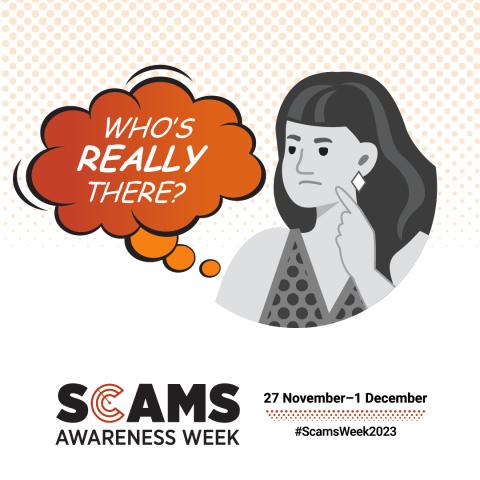
All digital assets
Download all the campaign digital assets (logos, social media, email signatures etc) at once.
Download zip (27 MB)
More resources
Listen to Be Connected's podcast, Avoiding impersonation scams
Download a guide to impersonation scams from Be Connected




